Every year, on the last Sunday in March in the UK, the clocks go forward an hour at 1 a.m. Known as British Summer Time, it aims to harness the extra hours of daylight afforded by setting the clocks forward at this time of year.
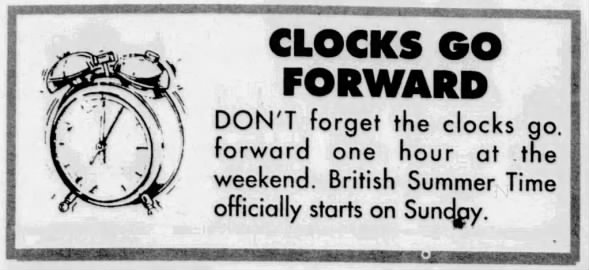 22 Mar 1995, Wed North Tyneside Herald and Post (Wallsend, Tyne and Wear, England) Newspapers.com
22 Mar 1995, Wed North Tyneside Herald and Post (Wallsend, Tyne and Wear, England) Newspapers.com
There have been many changes and updates to the practice over the years. Do you know your British Summer Time from your British Standard Time? What is British Double Summer Time? Let’s take a closer look at how British papers reported on the changes.
When did the clocks first go forward?
Daylight savings were introduced in Britain on 21 May 1916, during WWI, after Germany adopted the practice a few weeks previously. Clocks went forward an hour, going back an hour in October.
The Daily Mirror raised an interesting question in May 1916; what about the impact on animals? The answer was provided through an amusing cartoon, ‘Daylight Saving: The Animals’ Point of View’. The sparrows seem particularly displeased, but we’re sure they’ve caused their fair share of early wake-ups.
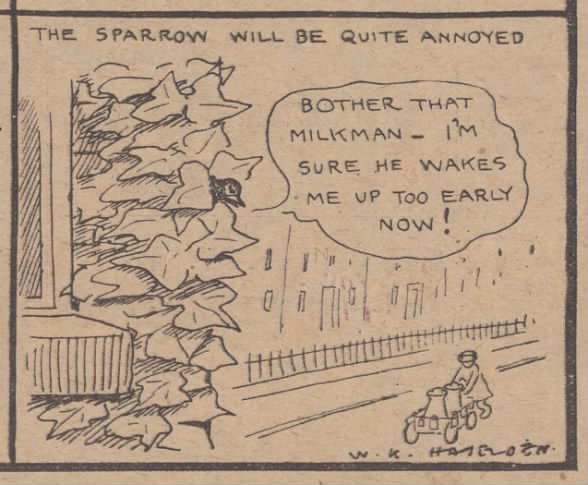 09 May 1916, Tue Daily Mirror (London, London, England) Newspapers.com
09 May 1916, Tue Daily Mirror (London, London, England) Newspapers.comWar forces more changes
Fast forward to WWII: in 1941, Britain went one step further and adopted British Double Summer Time. This new measure would see clocks go forward two hours during daylight savings, remaining one hour ahead of Greenwich Mean Time (GMT) during winter.
Men’s fashion retailer Moss Bros, still going today, saw an opportunity presented by the changes:
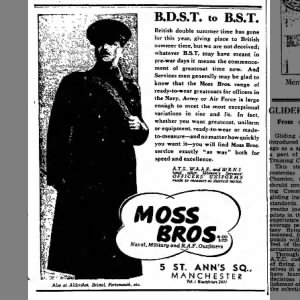 06 Oct 1941, Mon The Guardian (London, Greater London, England) Newspapers.com
06 Oct 1941, Mon The Guardian (London, Greater London, England) Newspapers.com
It was a lot to keep up with, and the new practice would stay in place until the summer of 1945, when WWII was finally over.
Was that the last of British Double Summer Time?
Fuel shortages forced the British Government to reintroduce British Double Summer Time in 1947.
British Double Summer Time had its critics, particularly among the farming communities upon whom the measures would significantly impact. Farmers in Gloucestershire made this tactful suggestion to the nation’s industrial workers.
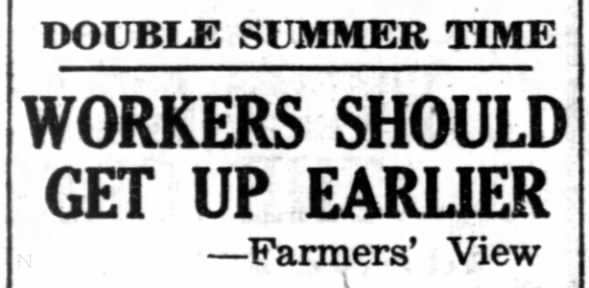 28 Feb 1947, Fri The Citizen (Gloucester, Gloucestershire, England) Newspapers.com
28 Feb 1947, Fri The Citizen (Gloucester, Gloucestershire, England) Newspapers.comWas that the last of the changes?
Not in the slightest. The Government introduced a short trial between October 1968 and October 1971, known as British Standard Time. The clocks would remain an hour ahead and would not require changing in October, as the Lincolnshire Echo subtly points out.
British Standard Time aimed to help British industry work closely with its European counterparts, but it failed to take off.
What did Britain adopt after the British Standard Time experiment?
In 1972, the British Summer Time Act prescribed that clocks would go forward in March (BST) and back in October (GMT). BST would come into effect on the morning of the day after the third Saturday in March or, if that was Easter Day, the day after the second Saturday. Still with us?
It certainly wasn’t clear to everyone. In 1983, a Midlands newspaper reported on the confusion of a vicar trying to establish the exact day the clocks go forward. According to the article, some diaries in the vicar’s possession claimed the change occurred on 20 March, while others suggested it was a week later. Enquiries made to the BBC and the London Weather Centre proved futile to the exasperated clergyman. The negative impact of changing the clocks at the wrong time was not lost on Reverend McQuillen: “When Sunday services begin at 8 a.m., it means a lot to get your times right.”
Were there any further changes to British Summer Time?
From 2002 onwards, all European Union countries, which at the time included Britain, agreed to change their clocks on the last Sunday in March and October. Much simpler.
The best efforts are made in the newspapers to ensure people remain aware of the time change, like this helpful and friendly reminder in the Huddersfield Daily Examiner.
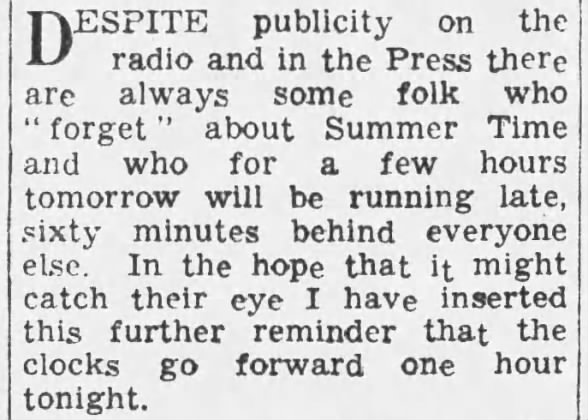 18 Apr 1953, Sat Huddersfield Daily Examiner (Huddersfield, West Yorkshire, England) Newspapers.com
18 Apr 1953, Sat Huddersfield Daily Examiner (Huddersfield, West Yorkshire, England) Newspapers.comBut some still get caught out
The BBC was not immune from the embarrassment of forgetting to change their clocks. A live link interview with actor David Soul in March 1978 could have gone horribly wrong when staff at the TV programme Swop Shop caused panic by not moving the clocks forward an hour. The Starsky & Hutch star was expecting the interview an hour later, but luckily they were able to track him down for the broadcast. We now have visions of David sliding across the hood of a car à la Starsky & Hutch, rushing to do the interview.
Looking on the positive side of British Summer Time
There were other advantages to the extra hour, highlighted by the Leicester Mercury. For party animals in 1996, a new law meant that discos were allowed to remain open for an extra hour when the clocks went forward. Previously, club-goers would lose an hour despite paying for a full night’s entertainment. When the clocks go forward, they were effectively partying until 3 a.m. The chips on the way home would almost count as breakfast.
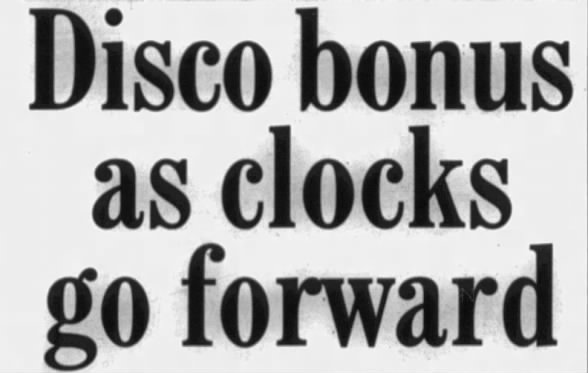 27 Mar 1996, Wed Leicester Mercury (Leicester, Leicestershire, England) Newspapers.com
27 Mar 1996, Wed Leicester Mercury (Leicester, Leicestershire, England) Newspapers.com
In April 1939, the Manchester Evening News revelled in the prospect of British Summer Time commencing that evening, highlighting all the outdoor recreations on offer, from 340 tennis courts to 28 plunge baths.
Adding to the positive vibes, three-year-old Shannon was excited about the extra hour of play afforded by the lighter evenings when the clocks go forward, as reported by the Atherstone Herald in March 1999.
With great time-pieces comes great responsibility
It’s one thing remembering to update the clock on your microwave, but it’s a completely different ball game when you’re responsible for the most recognisable clock in the world.
In 2015, the Evening Standard revealed the planning and efforts that went into aligning the faces of the Big Ben clock with British Summer Time. Under the care of clockmaker Paul Roberson, on the big day, his shift starts at 7 a.m., he’s on call at all hours, and he has to climb 334 stairs to reach the top of Big Ben. “But the worst thing,” he laughs, “is leaving your pass at the top when you’re heading home.”
Don’t forget to change your clocks, everyone!
Learn more about Daylight Savings on Newspapers.com™! And follow us on Facebook, X (Twitter), Instagram, Threads, and TikTok for more content like this!
Sources
1. https://www.rmg.co.uk/stories/topics/uk-time-british-summer-time-bst-daylight-saving
2. https://greenwichmeantime.com/daylight-saving-time/history-bst/


It’s saving time (singular) not savings (plural
It’s stupid time (singular) not stupids time. 🙂 DST. Daylight Stupid Time.
This site needs an official ‘drivers ed’ course on how they digitalize newspapers to clear up at least some of the confusion on here